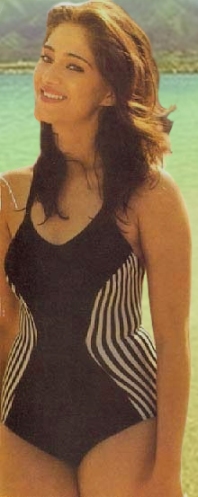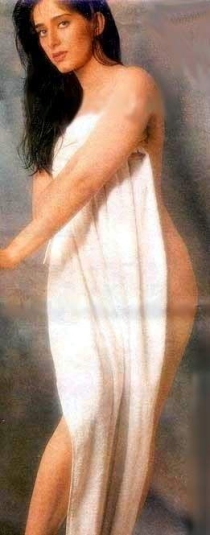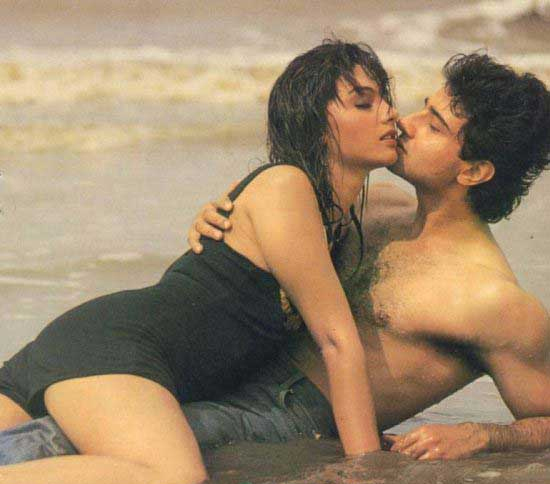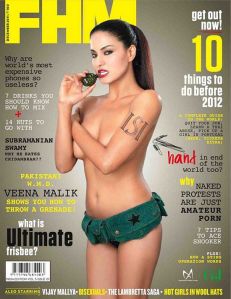With all this debate raging on about obscenity and vulgarity splattered across Pakistani screens, it seemed an appropriate time now for me to talk about the country’s two famous exports of 2012 — unadulterated television talk shows and actresses going topless. Such has been the influence of these antics in the previous few months that debates about them have even found way into the country’s Supreme Court.


New Media and Shamelessness
The only lasting heritage of the Musharraf regime has been a free, loud and raucous media that knows no boundaries when it comes to sensationalism and making a fuss about stories that don’t even matter to the average Pakistani. However, it was only when the media started occupying the moral upper ground and portraying itself as the fourth pillar of democracythat things just started to slip from their grasps.
Sex and Sexuality
Did all this fahashi start with Veena Malik? No, it certainly didn’t start with Veena Malik shedding her clothes for FHM. Countless earlier actresses had previously managed to successfully pull off topless, sometimes even nude, shoots. Anita Ayub is one such gem. During her stint in the Pakistani entertainment industry, she hardly got enough recognition to kick-start a lucrative career for herself within her homeland. From one exploitative industry to another – Anita moved to India.
She started modelling at first. She had already been modelling in Pakistan for various fashion outlets and photographers in the late 80s and the early 90s. Comfortable in her own skin, she even asked the Pakistani government to endorse her entry into the Miss World pageant representing Pakistan; only to be shunned by the Pakistani mullahs.
Hypocrisy, hypocrisy!
General Zia-ul-Haq’s Islamisation attempts had only left a legacy of stricter, yet nonsensical, Islamic laws with mullahs all over the land playing guardian to the man-made pseudo-religious doctrines.
What Anita couldn’t understand was that almost every other Muslim country had a representation in the coveted pageant (Egypt, Lebanon, Syria, Turkey and Iran had their lined up), why then can’t Pakistan participate with a model who was willing to do so?
Her controversial modelling career exposed her to the eyes of a few exploitative directors in the Indian cinema and Bollywood welcomed her in its embrace. Thinking back, Anita expressed in an interview that she never was a success in the industry.
She was never a ‘hit’ as an actress in the Bollywood industry, neither was she a success on the modelling ramps. It was her brief stint as a controversial model, with her topless and scantily clad shoots that shot her to fame.
Controversy Defined Success for Pakistani Actresses
Anita was anything but coy. Controversies and scandals that might otherwise thrust any celebrity into shambles only strengthened her resolve.

She realised that the controversy that surrounded her actually defined her. In an industry driven by men, women were usually kept out of the limelight. She had to do something about this masochistic attitude surrounding the way in which the industry excelled. She revelled in the fact that people loved to “hate” her. Nevertheless, she paved the way for more Pakistani actresses to come across the border and try out in the land of dreams.
Soon afterwards, Anita Ayub was joined by her sister Amber. If it hadn’t been for the tensions rising up in India and Pakistan on Kashmir, they’d have enjoyed a slightly lengthier time in the industry. The Indian officials denied them both entries into the country because they thought the two had sentiments for the mujahideen fighting in the Kashmir valley.
It was only then that it became quite obvious that if Pakistani actresses ever were to be celebrated as entertainers in a predominantly male-driven Indian film society, they’d have to side with controversy to achieve success. Who cares about morals when shedding a few clothes might just get you where you want to be.
Controversy was something that later Pakistani actresses coming across the border to India would master and the one name that immediately comes to mind is that of Somy Ali.
Pakistani Invasion of the Late 90s
Somy Ali came to Bollywood amidst chaos, with the two nations fighting to muscle out the other in a nuclear race and over matters concerning Kashmir. If anyone could’ve softened the Pakistani image in India, it was Somy alone. She felt at home in the industry and, much like Anita and Amber, stirred up quite a storm on her arrival.

Although Somy was later joined by other Pakistani actresses like Zeba Bakhtiar, she remained the one image that was etched into the memories of a large majority of the cinema-going audiences – only because she chose not to entertain masochistic reservations about obscenity and vulgarity. She would shed clothes, only because she wanted to – she didn’t reason her choices out to the mullahs, she just did it without regret.
This worked wonders and she was seen paired against some of the A-listing heartthrobs in the industry. She worked alongside Sunil Shetty, Mithun Chakraborty, Saif Ali Khan, Chunky Pandey, Amol Palekar, Dharmendra, Govinda, Sanjay Dutt and Aditya Pancholi. Zeba, on the other hand, only bagged a handful of films.
Not only did Somy manage to attract huge names to work with her, she even wooed a few into her personal life as well – Salman Khan is said to have dated the Pakistani heroine for much of the late 90s and up until the dawn of the new millennium.
Somy was rather disappointment of the overall resentment she received from the pseudo-religious fanatics in her own homeland and later retreated to America. Meanwhile, with the mullahs were fixated on the levels of vulgarity rising across the border, they completely ignored the true extent to which vulgarity had already seeped into the Pakistani film industry. Gandasa-wielding heroes and gyrating heroines made up for much of the space on the silver screen.
The Kargil war didn’t help much for the careers of the many actresses that found the Pakistani medium to be far more, and hypocritically so, vulgar than what was being offered by the Indian media. Television seemed to be one way these stars could retain their presence felt and known.
Musharraf freed up the media houses ushering in a myriad of studios and television channels breaking out all over Pakistan. Actresses that had taken the decision to join the small screen revolution finally felt the blow when fresher, incoming talent began to take up more face-time on the tube. Meera and Reema were two actresses that found space on the television screens, and part of this transformation dictated that they reimagine their surnames – both decided to go with Khan.
Trying Out the Age-Old Formula
Where Reema stuck with the entertainment models that telly had to offer, Meera diverted from her ambitions and started conversing with directors from across the border. One such director was Mahesh Bhatt – an avid pursuer of exploitative cinema and ushering in new talent. For his film with Meera, Bhatt went a few steps further and scouted for singing talent from Pakistan as well.

If it hadn’t been for Meera’s desperate attempts at getting into the Bollywood industry, Bhatt wouldn’t have considered looking out for singers that have now proven to have made Pakistani pop revival something every Pakistani is proud of. In a way, Meera shedding clothes worked out well for the Pakistani music industry.
Shaking the Genie Out
Meera was resented as much as any other actresses that went across the border; however with Meera, she was also ridiculed on prime-time television homewise (she still often gets bashed by the media). This just shattered her ambitions further and she eventually gave up on it altogether. You’d suppose that piling such pressure on any actress going the Bollywood way would discourage any other attempts; although, inertia it seemed had already been shaken into motion.

Television in Pakistan, it seemed, couldn’t get enough of the juiciness such endeavours entailed. They would only sprinkle a fair bit of masala amplifying only the vulgarity of such ventures rather than attempt to justify the motivation of these starlets. Media was free, vibrant and unadulterated in Pakistan now. Talk shows on Pakistani tellies then showed no signs of adulteration and started focusing on debates and conversations that cannot entirely be justified to become the zenith of homely living rooms.
It wouldn’t be until the December of 2011 that Pakistan finally got an overblown response from the media on the outrageous spread of vulgarity on South Asian screens – Veena Malik shed her inhibitions and massed up enough controversy around her topless shoot with the FHM magazine. This sparked outrage not only amongst the many mullahs already keen on drafting fatwas against her, but also the audiences bound to the screen on prime-time television in Pakistan.
Pakistani media, without being mindful of their actions, simply plastered the obscene images on the television screens during regular news coverages of Veena’s desperate attempts at garnering some sexual appeal. And to everybody’s surprise, her antics actually did work out for her – in no time at all, she was flooded with offers to dance and act in films. Low-budget films may have been the only avenues she could use to enter the industry; nevertheless, she quickly garnered a satisfactory response from audiences on both sides of the border.
And Then Came Mathira
Up until this particular point in time, it seemed Pakistani actresses found comfortable and even willing to shed their inhibitions and exposing skin but only across the border in India. However, this all was about to be taken for a ride when Mathira decided it was time to initiate a similar trend on home soil – going topless, but in Pakistan.
 |
The Whore Wars
Just when Mathira thought she could get away with going headstrong against Veena Malik, Veena got into a brand new game – she decided to get into the Pakistani music industry, the one industry in Pakistan that has seen tremendous growth over the years. Veena Malik started advertising her new song, aptly titled “Drama Queen” – a very befitting title I might say.
| Above: Veena’s debut song, Drama Queen; and below: Video diary leading up to the eventual release of the song. |
Could Mathira have regressed into submission with her contemporary pushing into the music industry? The answer is no – she quickly ripped an Akcent hit My Passion and sung an Urdu copy entitled Jadugar (see below).
Veena Malik looked stunning in this very bold photoshoot she did for her upcoming movie “Supermodel”.
I hope this film’s not as disappointing as her previous attempts, ala Gali Gali Chor Hai and Daal Main Kuch Kala Hai. I have no haste in going to a cinema to watch Supermodel anytime soon.
[…] And, anything and anyone that is not Islamic: Churches, cinemas and everything goes. PS: We love Christians and we secretly download pictures of Veena Malik from the Internet. […]
[…] tiny bit of skin) in Pakistan. And what better to counter these demands than to promote home-grown celebrities like Veena Malik and Mathira strutting their stuff out to desi tunes and shedding all for the cameras. Wouldn’t you agree […]
ina de pudhean ich mera loraaaa
putting my long shaft in their pussies